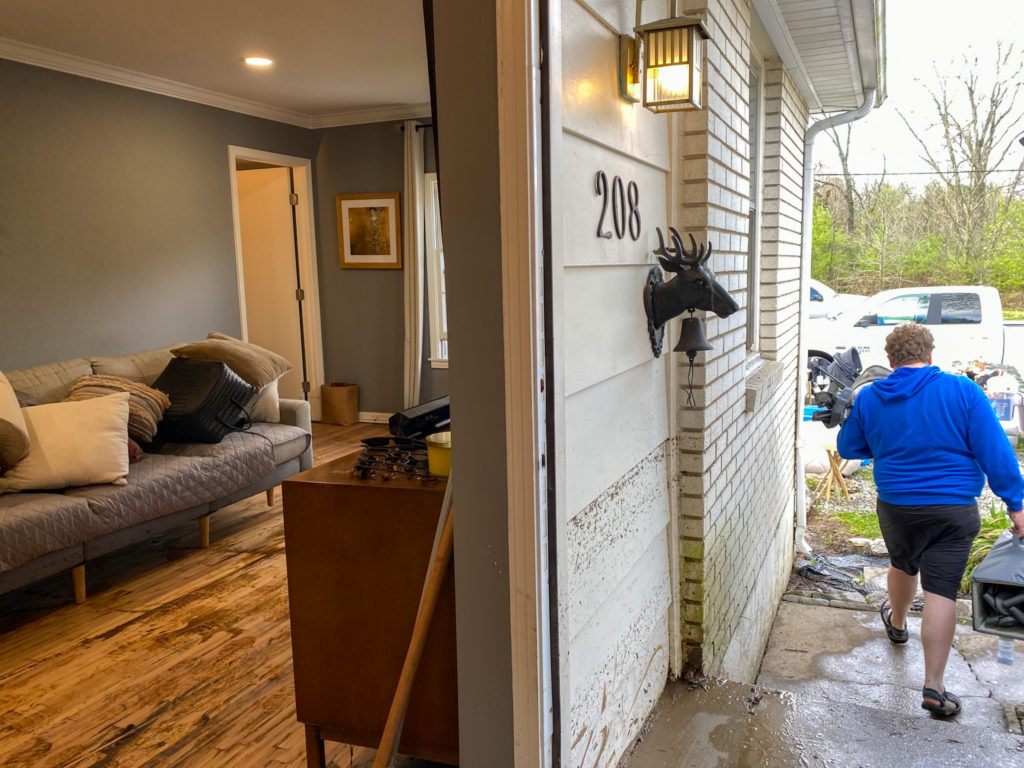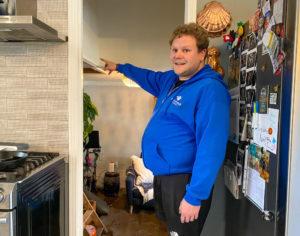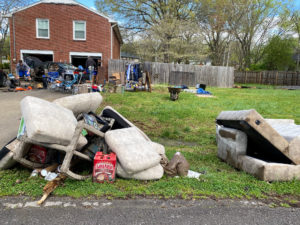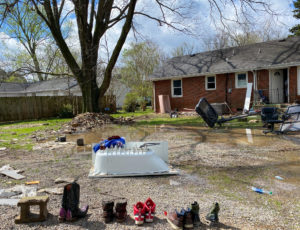
The baby is due in less than two weeks, and the nursery is a soggy, muddy mess. But Corey Long doesn’t care that the brand-new crib is airing out in the driveway or that his wife’s car has floated away or that the expensive throw pillow he just bought is ruined.
Long is grateful that he and his wife are alive.
“It was really scary,” he says the morning after his Crieve Hall home flooded. “There were definitely a couple of moments there when I was like, ‘This is not good.'”
Long and his wife are two of the 130 people rescued during flash floods Saturday night, which caused rivers and creeks to crest so high that homes and roads brimmed with water. At least four Nashvillians died from the 7 inches of rainfall.
 Samantha Max WPLN News
Samantha Max WPLN NewsCorey Long points to the attic where he and his wife took refuge with their two dogs Saturday night.
But before the rescue team made it to Long’s home, he felt like he was running out of options.
Long’s wife is nine months pregnant. She was trying to get some rest in their guest room when the water started pouring through the door frames “like Titanic,” Long says.
So, they called the police, grabbed their two pugs and ran to the attic, where they waited in the darkness for about two hours.
“One of us has got one dog, the other’s got the other, and we’re just kind of telling each other that we love each other,” Long says. “It’s terrible to talk about, honestly. It wasn’t fun at all.”
Long doesn’t know what comes next. He’s in crisis mode now, piling water-logged belongings in the front yard, drying out the floors and getting ready for his wife’s April 9 due date.
But his wife got the all-clear from the hospital, their pugs are shaken up but safe, and they even managed to save a portrait of his late father — one of the few possessions Long considers irreplaceable.
“It sucks that our stuff’s gone, but we’ve worked hard for it, and we’ll work hard for it again,” Long says, adding that most of what was lost doesn’t really matter to him. “It really doesn’t.”
‘Like a river’
All along this muck-covered neighborhood, people are feeling tired, dirty, frustrated. But they are also feeling hope.
 Samantha Max WPLN News
Samantha Max WPLN NewsSoggy furniture airs out in a yard in Crieve Hall Sunday morning.
“It’s times like this where you just have to put your faith into action,” Brandon Nall says as he cleans out a friend’s house.
The basement was destroyed, and a crew of helpers has started emptying chairs, clothing and other wet belongings onto the driveway. A grimy sectional sofa is stacked in pieces in the yard.
“We’re just loving on him,” Nall says. “It’s the right thing to do, to be here, supporting our buddy.”
Though the city received less rain than it did during the 2010 flood, Gregg Lebel says the downpour seemed more intense. He had just moved into his home on Brewer Drive when that storm hit, and he knows how dangerous the neighborhood can get when the creek starts to rise.
“It was sweeping down the street, just, literally, like a river. I knew it was going to go sideways,” he says. “That’s when I got in the truck and started driving around.”
 Samantha Max WPLN News
Samantha Max WPLN NewsGreg Lebel drove through high waters Saturday night to warn his neighbors about the flood. He says the conditions were “sketchy” but that he wanted to make sure everyone was awake.
Lebel warned as many neighbors as he could. Many had been asleep, completely caught by surprise.
He didn’t expect to live through two 100-year floods in just over a decade. And he says he doesn’t have flood insurance, so he’ll be paying for the damage to his back yard out of pocket.
But Lebel says he has no plans to move out of the flood zone.
“It happens,” he says. “It’s just like, if you get hit by a tornado, you’re not going to just pack up and move to the desert, because, you know, a tornado hit your neighborhood.”
His neighbors down the road, on the other hand, don’t have much of a choice.
Carlos Ramirez spent Sunday morning helping out some friends whose rental house was teeming with muddy water. A basketball hoop had flipped sideways into a pool of water on the dirt driveway, just feet from a line of cowboy boots and sneakers that had been salvaged from the home.
“I feel bad for them, because this is not easy. They don’t have food or anything,” Ramirez says in Spanish. “But what can we do?”
 Samantha Max WPLN News
Samantha Max WPLN NewsA row of cowboy boots and sneakers survived unscathed from this otherwise flooded rental home in Crieve Hall.
Ramirez says it’s been a hard year for him and his friends, whom he calls his brothers. They all came here from Mexico and work together in construction.
Now, his friends will have to stay in a hotel until they can find another apartment. But he says that won’t be easy, since not all of them have Social Security numbers.
“We have to work and overcome. There’s nothing else to do,” Ramirez says, tears beginning to dribble down his cheeks. “One thing happens to us and then another.”
But this neighborhood knows how to clean up after a storm.
All along the block, neighbors, relatives and friends have turned out to help each other. They pump water from submerged basements, hose away streaks of mud and haul armfuls of shirts and shoes and furniture into open air, where the warm breeze has begun to dry up the swampy mess.
As Long looks out at his driveway filled with possessions, he says he wishes he were having a yard sale, not emptying out his flooded home.
But he doesn’t dwell on it. A moment later, Long is already back at work, making a trash pile. The time has come to start letting things go.
Samantha Max is a Report for America corps member.

